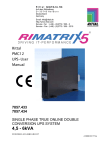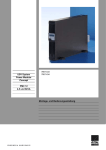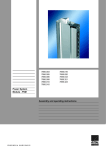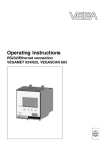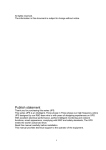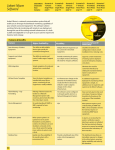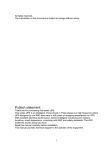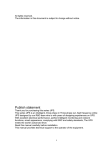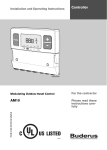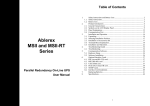Download Rittal 7857.434 Troubleshooting guide
Transcript
UPS System Power Modular Concept 7857.433 7857.434 PMC 12 4,5 and 6kVA Assembly and Operation Instructions Microsoft Windows is a registered trademark of Microsoft Corporation. Acrobat Reader is a registered trademark of Adobe Systems Incorporated. 5.2. EN Table of Contents Start-up in Battery Mode (Cold Start) ......... 18 5.3. Check Measured Values & Figures detected by UPS 19 IMPORTANT SAFETY INSTRUCTIONS ..3 5.4. UPS Default Data and Special Function Execution...................................................................... 20 1.1. Documentation Notes ........................................3 1.2. Retention of Documents...................................3 1.3. Symbols Used.....................................................3 5.6. UPS Is Off Due to Unknown Reason and It’s Trouble Shooting ......................................................... 22 1.4. Safety Instructions ............................................3 5.7. Shut Off........................................................... 23 1.5. Proper Use .........................................................4 5.8. Maintenance Bypass Mode ............................ 23 1.6. Storage Instructions..........................................4 6. TROUBLESHOOTING GUIDE ..... 24 2. PRODUCT INTRODUCTION ..........5 6.1. Troubleshooting.............................................. 24 2.1. General Characteristics ....................................5 2.2. Special Features.................................................5 7. BUNDLED SOFTWARE INSTALLATION GUIDE ......................... 25 3. UPS FUNCTIONAL DESCRIPTIONS 6 5.5. UPS Default Settings and their alternatives. 22 7.1. Hardware Installation.................................... 25 7.2. Software Installation ...................................... 25 3.1. UPS Front Panel Display ..................................6 3.1.1. Symbols on the LCD DisplayPanel............6 8. OPTIONAL COMMUNICATION CARD...................................................... 25 3.2. Rear Panel Descriptions ...................................8 3.2.1. UPS input and output .................................8 3.2.2. Battery input...............................................8 8.1. SNMP Adapter ............................................... 25 8.2. Internal SNMP Adapter ................................ 26 3.3. Communication Port Explanation...................9 3.3.1. EPO (Emergency Power Off).....................9 3.3.2. RS232 Port Descriptions ............................9 4. INSTALLATION ............................10 4.1. Unpacking........................................................10 4.2. Selecting Installation Position ........................11 9. HOT SWAPPABLE BATTERY REPLACEMENT..................................... 27 10. CUSTOMER SERVICE ................. 27 11. TECHNICAL DATA ...................... 28 4.3. Assembling of the different System Components ..................................................................12 4.3.1. Tower Assembling steps ..........................12 4.3.2. Rack installation step................................13 4.4. Electrical Installation......................................16 5. OPERATION .................................17 5.1. Start-Up In Normal Mode ..............................17 2 UPS-Manual Important Safety Instructions Important Safety Instructions 1.1. Documentation Notes The audience for this guide is the technical specialist familiar with the assembly, installation and operation of the PMC12 UPS-System. You should read this operating guide prior to commissioning and store the guide so it is readily accessible for subsequent use. Rittal cannot accept any liability for damage and operational malfunctions that result from the non observance of this guide. 1.2. Retention of Documents This guide and all associated documents are part of the product. They must be given to the operator of the unit and must be stored so they are available when needed. 1.3. Symbols Used The following safety and other notes are used in this guide: Symbol for handling instructions: • This bullet point indicates that you should perform an action. Safety and other notes: Danger! Immediate danger to health and life! Warning! Possible danger for the product and the environment! Note! Useful information features. and special 1.4. Safety Instructions 1. Assembly and installation of the UPS, in particular for wiring the enclosures with mains power, may be performed only by a trained electrician. Other tasks associated with the UPS, such as the assembly and installation of system components with tested standard connectors, and the operation and configuration of the PMC12 UPS-System may be performed only by instructed personnel. 2. Do not open the case, as there are no serviceable parts inside. Your warranty will be void. 3. Do not try to repair the unit yourself; contact your local supplier or your warranty will be void. 4. If liquids are spilt onto the UPS or foreign objects dropped into the unit, the warranty will be null and void. 5. Do not install the UPS in an environment with sparks, smoke or gas. 6. This UPS is equipped with an EMI filter. To prevent potential leakage current hazard, ensure that the AC main supply is securely grounded. 7. This UPS is designed to be installed and commissioned in a sheltered, controlled environment as follows: - Operating temperature 0-40°C and 30-90% non-condensing humidity. - Always avoid contact with direct sunlight. - Do not install the UPS in inflammable or hazardous environment. - Dusty, corrosive and salty environments can do damage to any UPS. - Install the UPS indoors as it is not designed for installation outdoors. 8. To prevent any overheating of the UPS, keep all ventilation openings free from obstruction, and do not place anything on top of the UPS. Keep the UPS rear panel 20 cm away from the wall or other obstructions. 9. The battery will discharge naturally if the system is unused for any length of time. 10. Install the UPS away from objects that give off excessive heat and areas that are excessively wet. 11. Always switch off the UPS and disconnect the batteries when relocating the UPS. 12. It should be recharged every 2-3 months if unused. If this is not done, then the warranty will be null and void. When installed and being used, the batteries will be automatically recharged and kept in top condition. 13. Make sure that the AC main supply outlet is correctly grounded. 14. Please ensure that the input voltage of the UPS matches the utility supply voltage. Use a certified input power cable UPS-Manual 3 EN Important Safety Instructions with the correct plugs and sockets for the appropriate voltage system. 15. Observe the valid regulations for the electrical installation for the country in which the unit is installed and operated, and the national regulations for accident prevention. Also observe any companyinternal regulations (work, operating and safety regulations). 16. Use only genuine or recommended parts and accessories. The use of other parts can void the liability for any resulting consequences. EN 1.5. Proper Use This UPS is designed for providing power to IT systems. A use different from that described here is considered to be an improper use. Rittal cannot accept any liability for damage resulting from the improper use or the non-observance of this guide. The guides for the used accessories may apply. Rittal prohibits the use for life-preserving applications (such as the use in hospitals or the direct patient care). Rittal expressly does not sell its products for such applications. Rittal will not accept any responsibility if a UPS is used in this area. 1.6. Storage Instructions For extended storage in moderate climate, the batteries should be charged for 12 hours at 3 month intervals by connecting the UPS to the utility supply and switch on input breaker located at UPS rear panel. Repeat this procedure every 2 months if the storage ambient temperature is above 30°C. 4 UPS-Manual Product Introduction 2.2. Special Features 2. Product Introduction 2.1. General Characteristics The double-conversion technology in accordance with the specification VFI-SS 111 guarantees the power supply to connected terminal devices with a pure sinusoidal voltage. 1. 2. 3. 4. 5. 6. 7. 8. The ultra-efficient PWM technology achieves a high efficiency for an almost sinusoidal output voltage. The high crest factor of the converter filters any switch-on current peaks without the loading needing to be modified. A fully digitalised control circuit provides a high level of protection and enables future upgrade. In-built communication capability enhances its ability for remote control and monitoring. The multi-functional LCD/LED panel will display various status of the UPS. The LED display may show UPS working status, Utility Status and UPS Abnormal status, whilst the LCD display may show Input/Output Voltage, Frequency, Load Status, Inner cabinet temperature, and Abnormal Phenomenon. To protect the unit from overloading, it automatically switches to bypass mode in ~160 seconds if loading is at 105% of rating and in case of overloading of more than 150% of rating, it switches to bypass mode immediately. It will automatically switch back to inverter mode once overload condition ceases. If a short-circuit occurs at the output, the UPS switches the system into standby operation. The UPS issues an audiovisual alarm and automatically interrupts the current output until the short-circuit has been corrected manually. Should the unit become overheated, the internal thermal switch will detect the heat and switch to bypass mode and vice versa. Maintenance-free sealed-type battery minimises after-sales service. The maintenance bypass switch provides easy and safe troubleshooting or maintenance function when the utility is normal. The transformer-free converter technology with a housing that can be mounted in a rack or used as floor-standing enclosure allows the UPS to be integrated even in environments with restricted space. 1. The UPS is equipped with an intelligent microprocessor-based controller and offers a flexible configuration capability with remote communication and comprehensive overload protection. 2. A large 184 V ~ 288 V input voltage range permits an undervoltage and overvoltage correction without unnecessary battery discharge and so ensures an increased battery lifetime. 3. The cold start function ensures that the UPS can be switched on even when no mains voltage is present (see chapter 5.2). 4. An optimum battery management system analyses the charging state of the battery in order to maximise the battery lifetime. 5. The "Active Power Factor Correction (PFC)" control function keeps the "Input Power Factor (PF)" of the UPS to a value > 0.99. This allows an excellent energy efficiency to be attained. 6. Selectable bypass input voltage tolerance (high/low sensitivity) ensures that the consumers are not supplied with undervoltage or overvoltage during bypass operation. The selectable voltage ranges are: (i) low sensitivity: 184 ~ 260 V (ii) high sensitivity: 194 ~260 V. 7. Fixed selectable output voltages (220/230/240) to satisfy the requirements for different voltage systems. 8. The UPS satisfies all relevant EMC regulations. UPS-Manual 5 EN UPS Functional Descriptions EN 3. UPS Functional Descriptions of the UPS. ⑫ To re-confirm the change of UPS Setting 3.1. UPS Front Panel Display 3.1.1. Symbols on DisplayPanel Item Symbol 1 LINE Battery Low 3 Battery Abnormal 4 UPS Overloading 5 UPS Working Service Mode1 6 A Blackout Transfer occurred in UPS Output the utility input voltage is within the window; the LED flashes flickeringly to indicate that the utility input voltage is within the acceptable window. 8 Green LED lights up to indicate Bypass 10 9 ⑤ ⑥ UPS Fault or Abnormal ⑦ UPS On/Alarm Silence ⑧ UPS OFF Switch ⑨ Special functions log in/out ⑩ Go to next page ⑪ Go to previous page or change the setting 6 LINE OFF UPS Shutoff UPS Abnormal Lock UPS Flow Chart 12 4 Digit Measurement Display 13 Indicates the item desired to be measured 14 UPS ON Switch or Alarm Silence 15 UPS OFF Switch UPS is working under ECO (Economic, Line-interactive) mode. OFF 11 Green LED lights up to indicate the UPS has the capability to run under redundancy mode. in Bypass Input Abnormal, UPS fails to transfer to bypass, Bypass Abnormal at ECO mode Utility Input Abnormal ② Green LED steadily lights up to indicate that ④ Utility or Bypass Source 2 ① LCD Display Input is normal. LCD Description 7 ③ the 1 The specified modes include Normal mode, ECO mode, CVCF mode, etc.. UPS-Manual UPS Functional Descriptions 16 Previous Page or Setting Change 17 Next Page 35 Special Function Log in /out Enter or Reconfirmed Utility Input Normal LED Utility Input Normal LED UPS under Redundancy Mode UPS under ECO Mode 18 19 20 21 22 23 36 Er27 37 Er28 38 Er31 39 Er** CVCF mode with Bypass input EN The UPS must be operated in normal mode in parallel system Bypass Overload Time out and cut off output The settings of both control board and driver board are not matched each other Other Error Code UPS Fault or Abnormal Warning LED 24 25 EPO 26 Er05 27 Er06 28 Er10 Emergency Power Off Battery Weak or Dead Output Short Circuit Inverter Overcurrent 29 Er11 UPS Overheat 30 Er12 UPS Output Overloading 31 Er15 Wrong Procedure to Enter Maintenance Mode 32 Er16 33 Er17 34 Er24 Er21 Output Parameters Set Error in Parallel System ID Numbers are in conflict in Parallel System or ID number Error in single unit Parallel communication error (communication wire disconnected or failure to find ID1 UPS ) in parallel system UPS-Manual 7 UPS Functional Descriptions 3.2. Rear Panel Descriptions EN A B C E D F H G A B C D E Terminal Resistor for Parallel function RS232 Port EPO Port Utility Input Breaker CAN Bus Connection Port for Parallel System F External Battery Connector G Cooling Fan H Utility Input &UPS Output Power Connector 1 L in 2 N in PE 3 L out 4 N out I Customer Options Slot J Slot 3.2.1. UPS input and output Model 4,5 kVA Maximum Current 24 A Conductor Section 4 mm² 6 kVA 32 A 4 mm² 3.2.2. Battery input 8 Model Maximum Current 4,5 kVA 25 A 6 kVA 25 A Conductor Section AWG #10, 6 mm² AWG #10, 6 mm² UPS-Manual I J UPS Functional Descriptions 3.3. Communication Port Explanation The Communication port on the UPS provides true RS232 type communication with the UPS software to remotely monitor the power and UPS status. The bundled UPS software is compatible with many operating systems such as Windows 98, & 2000, ME, NT and XP. For other applications like Novell, NetWare, Unix, Linux, please contact your local distributor for a proper solution. Highest Priority (in descending order), 1) EPO input port 2) Optional Interface card 3) RS232 3.3.1. EPO (Emergency Power Off) The Pin assignments of the EPO Input port are: 1 2 1 Æ EPO+ 2 Æ Ground To enable the EPO function, please short Pin 1 & 2. 3.3.2. RS232 Port Descriptions The RS232 interface shall be set as follows: Baud Rate Data Length Stop Bit Parity 2400 bps 8 bits 1 bit None The Pin Assignments of the true RS232 port are illustrated as follows: 9 8 7 6 UPS-Manual 5 4 3 2 1 Pin 3: RS232 Rx Pin 2: RS232 Tx Pin 5: Ground 9 EN Installation EN 4. Installation Warning! Please thoroughly read the Safety Instructions (chapter 1.4) before installing the UPS 4.1. Unpacking Inspect the delivery conditions of the UPS upon receipt and notify the freight forwarder and the dealer in case of any visible damage of the packing of the product The packaging is recyclable; save it for reuse or dispose it properly. • • Remove the UPS from the carton box. Check the package contents. Standard contents shall include: - 1 set of Users Manual 1 set of UPS communication software with RS232 cable 1 set of accessories pack - A1 A2 A3 B1 B2 B3 C1 C2 R1 R2 Include in Battery Module S1 10 option S2 S3 UPS-Manual S4 Installation 4.2. Selecting Installation Position 0 0 Warning! The UPS is heavy. C 40 C EN 0 Select a location sturdy enough to handle the UPS weight. To ensure proper operation and long operating life, always position the UPS according to the following criteria: Keep minimum 30cm (12 inches) distance clearance from the rear panel of the UPS to avoid any obstructions. Relative Humidly (non condensing) 30%~90% Do not block the air-flow to the ventilation louvers of the unit. Please ensure the installation site is free from excessive dust and the ambient temperature and humidity should be within the specified limits. Do not place the UPS in a dusty or corrosive environment or near any flammable objects. This UPS is not designed for outdoor use. 30 cm UPS-Manual 11 Installation 4.3. Assembling of the different System Components EN 4.3.1. Tower Assembling steps Step1: Mounting of Foot Cover and Power Module S3 12 UPS-Manual Installation Step2: Installation of Power Module and Battery Module EN S3 S1 A3 4.3.2. Rack installation step Step1: Mounting of Ear Handle B1 B2 S4 B1 B3 S4 UPS-Manual 13 Installation EN Step2: Installation of Ear Cover to Power and Battery Module S3 S3 Step3: Installation of Rail to Rack R1 R2 Step4: Installation Battery Module to Rail 14 UPS-Manual Installation EN Step5: Installation Power Module UPS-Manual 15 Installation EN 4.4. Electrical Installation Connect the UPS with the parallel hot swap chassis (DK 7857.443 or DK 7857.444), the external bypass (DK 7857.441) or with installation cable DK 7857.446. Please make sure, that the parallel hot swap chassis, the external bypass or the installation cable is installed correctly. For further information please read the manual of DK 7857.443 / DK 7857.444, DK 7857.441 or DK 7857.446. Danger! Before starting the installation, please make sure the grounding is connected properly. • Make sure Utility breaker, UPS’ Utility breaker is On “Off” position. Warning! Make sure the voltage of Utility matches with the input voltage window of the UPS. 16 UPS-Manual Operation 5. Operation EN 5.1. Start-Up In Normal Mode • Connect the Utility to the parallel hot swap chassis or the installation cable. Switch on the Power Breaker of the distribution panel and the breakers of the UPS’ Utility and Bypass Inputs, and then the UPS starts up. Green LEDs & light up to show the Utility and Bypass Inputs are normal and the LCD display with parallel function will illustrate Fig. A1, Fig. A2 to Fig. B. Otherwise the LCD display will illustrate from Fig. A2 to Fig. B. Fig. C Then, the UPS is under self-test mode again, the LCD display will illustrate from Fig. C to Fig. D and remain approx. 4 seconds under battery mode, then illustrate from Fig. E1 to Fig. F if the self-test is successful. Fig. D: It shows “test” Fig. A1 Fig. A2 Fig. B The UPS is on Bypass Mode now and it will proceed to self-test automatically. If there is no abnormal message it means the prestartup of the UPS is successful and the charger starts to charge the batteries. • Press the UPS On Switch for approx. 3 seconds, then the Buzzer sounds twice and the LCD display changes from Fig. B to Fig. C. UPS-Manual 17 Operation EN • Fig. E1: It shows “OK” in self-test and then the buzzer sounds twice. The LCD display will illustrate from Fig. A to Fig. G, and keep awake for approx. 15 seconds. Press the UPS On Switch of the UPS again for about 3 seconds till the LCD display illustrates from Fig. G to Fig. H, then the UPS will be in self-test Mode. The UPS may offer energy to the output in a minute, and the LCD display illustrates as Fig. I. In case of failure in pushing the UPS On Switch in 10 seconds, the UPS will automatically turn off. You then have to go through step in this chapter once again. Fig. E2: It shows “Fail” in self-test Fig. G: It shows “Off”, which means the UPS pre-start is successful Fig. F: It shows “220Vac” in Utility Input In case of failure in self-test, the LCD display will illustrate from Fig. D to Fig. E2, then an error code or error status will be shown on the screen. Note! Your start-up operation of the UPS is completed. Make sure the UPS is plugged onto the wall receptacle for charging at least 8 hours and the batteries of the UPS are fully charged. 5.2. Start-up in Battery Mode (Cold Start) Fig. H: It shows Utility input is “0” and Utility Abnormal Fig. I Note! Make sure the UPS you have has already been installed with at least 1 set (20pcs) of 12V/7Ah or 12V/5Ah batteries. • 18 once for Push the UPS On Switch approx. 5 seconds to awake the UPS, UPS-Manual Operation 5.3. Check Measured Values Figures detected by UPS & EN If you would like to check the measured values & figures detected by the UPS, please use scroll down and scroll up key pads. When you use scroll down key pad, the LCD display will illustrate as Fig. C(Voltage from Utility Input) ÆFig. I1(Voltage from Bypass Input) Æ Fig. J(Frequency from Utility Input) ÆFig. K(Frequency from Bypass Input) ÆFig. L(UPS Output Voltage) ÆFig. M(UPS Output Frequency) ÆFig. N(UPS Output Load %)ÆFig. O(UPS Battery Voltage) ÆFig. P(UPS Inner Temperature). Fig. L: It shows UPS output Voltage Fig. M: It shows UPS output frequency Fig. I1: It shows voltage comes from Bypass Input Fig. N: It shows UPS output load level(%) Fig. J: frequency from Utility Input Fig. O: It shows Battery Voltage Fig. K: It shows frequency from Bypass Input Fig. P: It shows UPS Inner Temperature UPS-Manual 19 Operation 5.4. UPS Default Data and Special Function Execution EN • After the UPS completes start up, press key pad to change the LCD display screen to Fig. Q1. Fig. R2: It shows self-test is “On” Fig. Q1: It shows buzzer “On” Fig. S1: It shows Bypass Voltage is adjusted to narrow tolerance Fig. Q: It shows buzzer “Off” • key pad to scroll down the Press screen and check the UPS settings. The LCD display will subsequently show: Fig. Q1 (buzzer) Æ Fig. R1 (Self-test) ÆFig. S1 (Bypass Voltage Windows) Æ Fig. T (Output Frequency Synchronization Window) ÆFig. U (Inverter Output Voltage) ÆFig. V1 (UPS Operation Mode) ÆFig. W (Output Voltage Micro Tune Value) ÆFig. X (UPS Id) ÆFig. Y (No. of UPS in Parallel). Fig. S2: It shows bypass voltage is adjusted to wider tolerance Fig. T: It shows Frequency Window is +/-3Hz Fig. U: It shows inverter output voltage Fig. R1: It shows self-test is NOT “on” 20 UPS-Manual Operation EN Fig. V1: It shows the UPS is operated in “normal mode” Fig. W: It shows Output Voltage Adjustment % from 0% to 3% or -0% to -3% Fig. V2: It shows the UPS is operated in “Eco mode” Fig. X: It shows UPS Identification Number Fig. V3: It shows the UPS is operated in “CVCF 50Hz mode” Fig. Y: It shows the UPS is the 1st of the parallel systems • Press scroll up key pad to execute special functions. The functions includes buzzer ON (as Fig. Q1), or buzzer OFF (as Fig. Q2, Alarm silence for UPS Warning) and self-test OFF (As Fig. R1) or self-test ON. (as Fig. R2. UPS will execute battery test for 10 seconds. If the self-test is successful, it will show as Fig. E1; otherwise, it will show as Fig. E2 & error message at the same time.) UPS-Manual 21 Note! If you want to set a frequency converter, it must be done by a qualified technician. Fig. V4: It shows the UPS is operated in “CVCF 60Hz mode” Note! If you want to set a frequency converter, it must be done by a qualified technician. Operation 5.5. UPS Default Settings and their alternatives EN • Make sure the UPS is not “On” yet. Press press “OFF” key pads for 5 seconds, then the LCD screen turns to Fig. AA directly, which means your setting changes are invalid. On Switch and scroll down key pads simultaneously for approx. 3 seconds, the buzzer will sound twice, the LCD display screen shows as Fig. Q1, then the UPS is under setting mode. To scroll down the LCD screen, you may refer to Chapter 5.4. Fig. Z: Please press Enter key to save data. Except for Buzzer (as Fig. Q1 & Q2) and Self-test (as Fig. R1 & R2), all the remaning default settings may be changed by pressing scroll up key pad. Fig. S1 and S2 show the bypass input acceptable window, it can be 184 VAC ~ 260 VAC or 195 VAC ~ 260 VAC. Fig. T shows the bypass frequency window of the Inverter Output, the acceptable setting values are ±3 Hz and ±1 Hz. Fig. U shows the acceptable Inverter Output Voltage, of which voltage is 200Vac, 208Vac, 220Vac, 230Vac, or 240Vac. Fig. V1, V2, V3 and V4 show the operation modes of the UPS, of which the alternatives are Online, Eco(Economic) mode, fixed 50 Hz Output or fixed 60 Hz Output. Fig. W shows the adjustments of the Inverter Output, which may be calibrated as 0%, +1%, -1%, +2%, -2%, +3%, or -3%. Fig. X shows a specified address & position of the UPS when the UPS is in Parallel mode. The settable numbers are from 1st to 4th. Fig. Y shows the total number of UPS in parallel. The settable numbers are from 1 to 4. Fig. AA: It shows the UPS is locked • Your Setting changes are complete. 5.6. UPS Is Off Due to Unknown Reason and It’s Trouble Shooting If there is a serious abnormal condition the UPS will lock it itself in “OFF” position as shown in Fig. AA and an abnormal message will show on the LCD screen After 3 seconds, all messages will be locked except Bypass messages(LED & LCD ). In cases where the Utility is abnormal after the UPS is locked, the LED will be extinguished and the LCD will be shown on the LCD screen. To release the UPS lock, please complete the following: When all the setting changes are done, you have to press enter key Pad to save all the changes when the LCD screen shows as Fig. Z, then, the LCD screen will show as Fig. AA to complete the setting changes. If you don’t want to change those settings, you may 22 Turn Off the breaker of Utility Input. UPS-Manual • Check those recorded. • Check Chapter 3.1.1 to trouble shoot the problem of the UPS. error messages Otherwise, consult your distributor for service. • • • local warranty will be void immediately. EN Press Off key pad for 5 seconds and buzzer will sound twice. Turn Off the Breaker of Utility Input. The UPS lock problem is solved now, but you should consult with your Local distributor to make sure the error message shown is solved. • Release the cover of the CAM Switch(Maintenance Bypass Switch) first, then turn on the CAM Switch to “Bypass” mode, and at the right-hand upper Corner of the LCD screen will show sign. • 5.7. Shut Off • Press Off key pad for about 5 seconds, the Inverter output will be turned off, then the output load is supplied by Bypass loop and the LCD screen shows as Fig. B. • Turn Off the breaker of Utility Input. The UPS is turned off completely. 5.8. Maintenance Bypass Mode Note! A Non-authorised technician is not allowed to operate the following procedures. If there is any damage under unauthorised condition, your Press the Off key pad for approx. 5 seconds, the LCD screen shows as Fig. B and the UPS output is in bypass mode. Turn off the UPS Utility breaker as well as the Bypass Input Breaker, you can now carry out UPS maintenance . To repeat 1.1, you may put the UPS back to normal working mode, then turn back the CAM switch to “INV” mode, fasten back the cover and repeat 1.1 The UPS will switch back to inverter mode. It is required to go through 5.8 first, then go through 5.8 If you skip 5.8, the UPS will alert for 10 seconds to warn that the procedure is abnormal, which may damage the UPS due to uncertain utility status. The UPS will switch back to Inverter mode immediately if you turn the CAM switch back to “INV”. UPS-Manual 23 Troubleshooting Guide EN 6. Troubleshooting Guide 6.1. Troubleshooting When the UPS malfunctions during operation, you may check the following: a. Is the input and output wiring correct? b. Is the input voltage of the Utility within the input window of the UPS? In case of problems or if symptoms still exist, please carry out the following steps. If the problem persists, please contact your local distributor for help. Situation Check Items Solution UPS Red Fault LED Check the error code 1.Check to see if the battery connection is lights up: shown on the LCD properly done, then re-charge the batteries for 8 hours to see whether the UPS may screen backup normally; otherwise, consult your local distributor right away. 1.Er05, & 2.Er06, Er10, Er12, 2. Remove some uncritical load at the UPS Er28 & output end. If any damage of the coating of 3.EPO AC power cord, please replace a new one. 4.Er11 5.Er15 3. Remove the short circuit occurred at the 6.Er16, Er27 EPO terminal. 7. Er21 8.Er24 4. Remove the objects blocked on the 9.other error code ventilation holes. 5. Make sure the UPS is operated normally. If it is on CVCF mode, you have to turn off and turn on the UPS again. 6. All of the parameters except ID Number in the parallel UPS must be same. Please refer chapter 5.5 to set them again 7. Reconnect the RJ-45 wire or set a UPS with ID=1. 8. When the UPS is on CVCF mode, it is prohibited to have bypass input. You have to turn off the UPS and bypass input and re-start the UPS. 9. Consult your local distributor for help. UPS fails to offer battery backup or its back up time is shorter than its calculation. If the backup time is still too short after 8 hours of charge, please contact your local distributor for battery replacement. UPS locks itself and it can not be turned off. Please refer to chapter 5.6 to trouble shoot the problem; otherwise, consult your local distributor for help. 24 UPS-Manual 7. Bundled Software Installation Guide 7.1. Hardware Installation 1. Connect the male connector of RS232 cable to the UPS communication port. 2. Connect the female connector of the RS232 cable to a dedicated RS232 port of the Computer. 3. For optional interface cards, please refer to Chapter 8 for more details. 8. Optional Communication Card EPO G DC 36V The Simple Network Management Protocol (SNMP) is a worldwide-standardized communication-protocol. It is used to monitor any device in the network via simple control language. The UPS-Management Software also provides its data in this SNMP format with its internal software agent. The operating system you are using must support the SNMP protocol. We offer our software with SNMP functionality for Novell, OS/2, all Windows running on INTEL and ALPHA, DEC VMS, Apple. Two types of SNMP interfaces with identical functionality are available: an external SNMP-Adapter (Box) and an internal SNMPCard. Both can manage a parallel system (N modules) and return either global values which are consistent for the whole parallel system - or specific values from the single modules. EN UPS External SNMP-Adapter 9 Ethernet 1 2 AC OUTPUT Internal SNMP-Card 8.1. SNMP Adapter 7.2. Software Installation Please install the Software which is on the enclosed CD or visit our website www.rimatrix5.com and for download from UPS software http://www.rimatrix5.com/service_support/do wnloads.asp The adapter may be configured via Telnet, HTTP (Web-Browser) or serial connection (Terminal). For normal operation at least one network connection (Ethernet) is required. The SNMP adapter can be used, utilising the RCCMD send function, for an automatic network wide shut down or just for informing connected users. The shut down procedure can be initiated on a low residual battery autonomy time (downtime) or by a countdown timer which is started at the beginning of the alarm. A shut down is therefore possible without extra input from the operator, and is fully software controlled. UPS-Manual 25 Optional Communication Card shut down possible without additional SNMP management software. 8.2. Internal SNMP Adapter EN The Internal SNMP-Card can be inserted into the appropriate slot of the PMC12. This adapter communicates via the serial port of the UPS and makes a direct multiple server 26 For detailed information please see Software Manual provided with the PMC-Software CD ROM. RCCMD - Remote Console Command module for a multi-server shutdown. This stand-alone software module is designed to receive and execute a command issued by a remote device. Thanks to RCCMD it is possible to execute a shutdown in an heterogeneous multiplatform network. The new release RCCMD 2 is an application available for all Operating Systems, analogous to PMC-Software. Our SNMP Interfaces are compatible to RCCMD. UPS-Manual Hot Swappable Battery Replacement 9. Hot Swappable Battery Replacement 1. Unscrew the flange of the battery bank front panel as indicated in Step 1. 4. Unplug the hot swappable connectors as shown in Step 4. 2. Remove the front panel as indicated in Step 2. 5. Remove the battery packs from the battery bank as shown in Step 5. battery 3. Remove the screw of the battery pack as shown in Step 3. 10. Customer Service If you have any technical questions or questions concerning our product spectrum, contact the following service address: Tel.: +49 (0)2772/505-1855 http://www.rimatrix5.com E-mail: [email protected] UPS-Manual 27 EN Technical Data EN 11. Technical Data Model 4,5 kVA 6 kVA INPUT Voltage Window 160~280 VAC* Frequency 45 ~ 65 Hz Phase/Wire Single, Line + Neutral + Ground Power Factor Up to 0.99 at 100% Linear Load Current THD <6% at 100% Linear Load OUTPUT Voltage Window 220/230/240 VAC Selectable Voltage Adjustment 0%; ±1%; ±2%; ±3% Voltage Regulation ±2% Capacity 4500 VA / 3600 W Rated Power Factor Wave Form 6000 VA / 4800 W 0.8 Lagging Sine Wave, THD<3%(no load to full Linear load) Frequency Stability ±0.2%(Free Running) Frequency Regulation ±1%; ±3% Transfer Time 0ms Efficiency(AC to AC, Normal) Up to 90% Efficiency(AC to AC, ECO) Up to 97% Autonomy at load 50% 100% 50% 100% 1 Battery 20 Min. 9 Min. 18 Min. 8 Min. 2 Batteries 48 Min. 23 Min. 45 Min. 20 Min. 3 Batteries 95 Min. 39 Min. 74 Min. 33 Min. DC Start Yes BATTERY Type Sealed Lead Acid Maintenance Free 12 V / 7 Ah Quantity 20 pcs Voltage 240 VDC Recharge Time 28 4 hours to 90% UPS-Manual Technical Data DISPLAY EN Status On LED + LCD Line Mode, Backup Mode, ECO Mode, Bypass Supply, Battery Low, Battery Bad/Disconnect, Overload, Transferring with interruption & UPS Fault. Readings on LCD Input Voltage, Input Frequency, Output Voltage, Output Frequency, Load Percentage, Battery Voltage & Inner Temperature. Self-Diagnostics Upon Power-on, Front Panel Setting & Software Control, 24-hour routine checking ALARMS Audible and Visual Line Failure, Battery Low, Transfer to Bypass, System Fault Conditions PHYSICAL Dimensions (WxDxH) mm 440x88x660 (UPS Module) Input/Output Connection Hardwire External Battery Connection Plug & Play Net Weight (Kgs) 24 (UPS Module) BATTERY BANK DIMENSIONS Convertible (Rack / Tower) 7857.442 (20pcs 12V/7Ah) 440x133x660(3U) BATTERY BANK NET WEIGHT 7857.442 w/o bat. / with bat. 18 kg/ 68 kgs ENVIRONMENT Operating Temperature Temperature Warning 0° C to 40° C The battery design life is based on a temperature of 25° C. Ambient temperature above this range will reduce battery life. Altitude 0~2000 m up to 40° C, 3000 m up to 35° C Humidity 90% RH Maximum, Non-Condensing Noise <50 dB (at 1 meter) COMPUTER INTERFACE Interface Type Standard RS232 Interface, EPO Communication Slots SNMP / WEB Card UPS-Manual 29 EN SAFETY CONFORMANCE Quality Assurance ISO9001 Certified Company Safety Standard EMC Standard EN62040-1, UL1778 EN62040-2, EN61000-3-2, EN61000-3-3, FCC Class A Marks CE, WEEE * (160~176Vac at <75% load) 30 UPS-Manual 04/11 – A38862 04 IT74 Rittal GmbH & Co. KG · Postfach 1662 · D-35726 Herborn Telefon +49(0)2772 505-0 · Telefax +49(0)2772 505-2319 · eMail: [email protected] · www.rittal.de
































